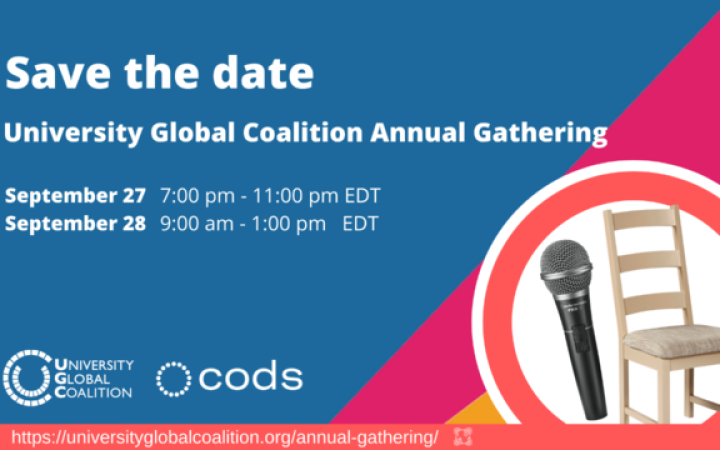2 September 2021, Geneva, Switzerland – On 28 September 2021, UNITAR and the University of Geneva, co-chairing the University Global Coalition Working Group on Open Innovation for the SDGs, host a session on "Reinforcing the SDGs through open innovation" in the 2021 University Global Coalition Annual Conference "Building Connections and Action for the SDGs".
The University Global Coalition (UGC) Working Group on Open Innovation for the SDGs was launched in October 2021 by UNITAR and the University of Geneva, in view of their long-standing partnership in promoting the education and practice of open innovation for the SDGs, and of their common agreed mission to develop relevant standardization and governance models for the Global Goals and the Agenda 2030.
The Working Group now counts nine members of global universities and educational institutions running open innovation activities, and aims to break silos on education for the SDGs through open innovation. By leveraging the experience of the network, the Working Group will foster a global movement of student-driven open innovation for the SDGs.
After its first milestone in the 2021 Geneva Trialogue “Scaling Open Innovation for the SDGs”, with the session on Mobilizing Youth at Scale, the Working Group now continues its impactful work, bringing together institutional and student leaders putting in practice open innovation to drive positive change, testifying on their participation and co-creation experience.
The interactive session “Reinforcing the SDGs through Open Innovation” will prominently feature the youth voice sharing their views on the value of becoming protagonists of open innovation environments, such as hackathons, the ways their SDGs projects and initiatives connect to the impact needs of international organizations and business communities, and the support provided by the latter to take the students' meaningful ideas further. Institutional leaders and partners of open innovation activities will have their say in building open, interdisciplinary, non-judgmental spaces where youth can thrive in creating innovation for the SDGs.
The session will take place on 28 September 2021, 15:45-16:30 CET.
Register here for the 2021 UGC Annual Conference to take place online on 27 and 28 September 2021.
For more information, please contact:
Afroditi Anastasaki, UGC Working Group on Open Innovation for the SDGs Coordinator
afroditi.anastasaki@unitar.org
About the University Global Coalition
Inspired by the Declaration on University Global Engagement, which has been endorsed by more than 100 universities and higher education associations from around the world, and with the support of the Rockefeller Foundation, a group of fifteen university presidents and higher education leaders from Europe, Asia, Africa, North and South America met in the Bellagio Center in Italy between May 20 and 24 of 2019 with representatives from the United Nations (UN Institute for Training and Research UNITAR) and the Sustainable Development Solutions Network (SDSN), to discuss the viability and advisability of establishing a University Global Coalition.
The idea behind the University Global Coalition is to form a global platform of universities and other higher education organizations committed to working together and in partnership with the United Nations (through UNITAR), SDSN, and other relevant organizations, in support of the Sustainable Development Goals both locally and globally through our education, research, and service missions.
About UNITAR
The United Nations Institute for Training and Research (UNITAR) is a principal training arm of the United Nations, working in every region of the world. We empower individuals, governments and organizations through knowledge and learning to effectively overcome contemporary global challenges. UNITAR was established in 1965 as an autonomous body within the United Nations with the mandate of enhancing the effectiveness of the work of the United Nations and its Member States. In 2020, UNITAR’s reach extended to more than 300,000 beneficiaries through mostly e-learning and webinars, face-to-face seminars and workshops, or other training-related events. (www.unitar.org)


